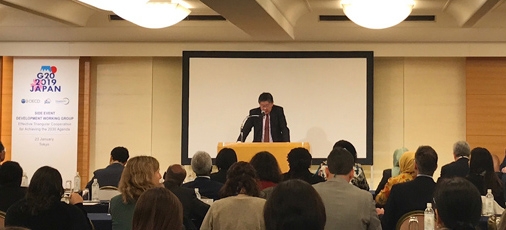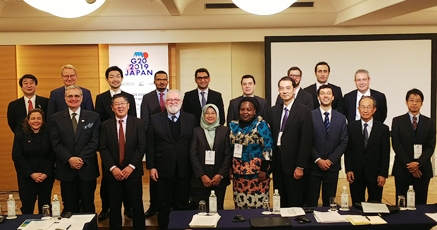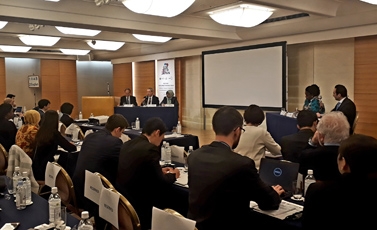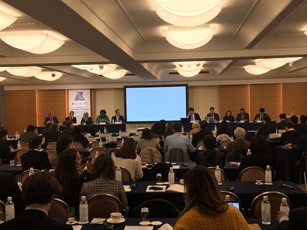G20 (Summit on Financial Markets and the World Economy)
Side Event of the G20 Development Working Group on "Effective Triangular Cooperation for Achieving the 2030 Agenda"
January 28, 2019
 Opening ceremony
Opening ceremony
 Family photo
Family photo
1. Overview
- (1) On Wednesday 23 January, the Ministry of Foreign Affairs of Japan (MOFA) co-organized a Side-Event entitled "Effective Triangular Cooperation for Achieving the 2030 Agenda" with the Organisation for Economic Co-operation and Development (OECD), the Japan International Cooperation Agency (JICA), and the Republic of Argentina in the margins of the first G20 Development Working Group (DWG) meeting under the Japanese Presidency.
- (2) In this side event, based on the typology of good practices in triangular cooperation, active discussions were held among approximately 140 participants from the G20 members and invited countries, international organizations, international development agencies, NGOs, and civil society for the purpose of confirming the matters to be tackled by the G20 members and invited countries and international organizations for achieving the 2030 Agenda and enriching the discussion in the Second High-level United Nations Conference on South-South Cooperation (BAPA+40 Conference) and the future G20 DWG. (Agenda (PDF)
 /Chair’s Summary (PDF)
/Chair’s Summary (PDF)  )
)
2. Opening remarks and Keynote speech
- (1) At the beginning of the side event, Mr. Kazuya NASHIDA, Director General, International Cooperation Bureau, Ministry of Foreign Affairs, Japan, made opening remarks. Mr. Kazuya NASHIDA, in his remarks, indicating triangular cooperation as an effective tool for meeting new needs for development, stated the importance of clarifying the role of various actors including the G20 based on the field practices in the field so that the knowledge and expertise of emerging and developing countries as actors of development cooperation will be further utilized. (Opening speech (PDF)
 )
) - (2) Mr. Jorge CHEDIEK, Director of United Nations Office for South-South Cooperation (UNOSSC) and the Envoy of the Secretary-General on South-South Cooperation, also made opening remarks. Mr. CHEDIEK, welcoming the side event as an important opportunity towards BAPA+40 Conference to be held in coming March, expressed deep appreciation for the initiative taken by Japan in leading triangular cooperation over the years. He also stated his expectations towards the increasing engagement in south-south cooperation and triangular cooperation by more Southern countries from the perspective of synergy with triangular cooperation.
- (3) Mr. Mario PEZZINI, Director of the OECD Development Centre and Special Advisor to the OECD Secretary-General on Development, made keynote speech. Mr. PEZZINI, in his speech, pointing out the drastic change of environment surrounding development cooperation along with the economic growth of emerging countries, stated that triangular cooperation will be able to fulfill the role as a new "laboratory" of development cooperation while becoming a platform for policy dialogue and mutual learning among various actors.
3. Overview of each session
 Session 1
Session 1
 Session 2
Session 2
(1)Session 1 :
"Typology of good practices and roles of various actors in Triangular Cooperation"
- Moderator:
- JICA (Prof. Akio HOSONO, Senior Research Advisor, JICA Research Institute)
- Speakers:
- Mr. Enrique O'FARRILL, Chief of Department of Bilateral and Multilateral Cooperation, Chilean International Cooperation Agency for Development (AGCIDl).
- Dr. Kirana PRITASARI, Director General of Public Health, Ministry of Health, Republic of Indonesia.
- Ms. Elisabeth FUPE, Nursing officer quality assurance coordinator, Muhimbili National Hospital, Tanzania.
- Mr. Uğuir TANYELÍ, Head of External Relations and Partnerships Department, Turkish Cooperation and Coordination Agency (TÍKA).
- i.At the beginning, Prof. HOSONO explained the objective of the session in which speakers from emerging countries would share their knowledge and expertise and the typology of their role as the pivotal core by presenting the examples of practices of triangular cooperation implemented by Japan.
- ii.Mr. O'FARRILL from AGCIDI, introduced the Japan-Chile Partnership Program (JCPP) started in 1999 and the "Disaster Risk Reduction Training Program for Latin America and the Caribbean (KIZUNA Project)", and presented how Chile had become "centre of excellence" in disaster prevention in Central and South America region after many years of bilateral cooperation with Japan.
- iii.Dr. PRITASARI from Indonesia introduced the project on maternal and child health handbook through domestic projects started in 1994 and widely deployed in Indonesia. She presented that their knowledge and expertise gained is now widely shared from her country as a global base with Asia, Middle-East, and African countries.
- iv.Ms. FUPE from Tanzania presented the experiences of "two-step Triangular cooperation" how Tanzania learned 5S-KAIZEN approach from Sri Lanka for Hospital performance improvement, adopted the Sri Lanka's model to the local context, and shared the knowledge and expertise with other countries in Africa.
- v.Mr. TANYELÍ from TÍKA, explaining the background and the features of its establishment, presented their experiences of actively developing south-south cooperation and triangular cooperation for neighboring countries under the collaboration with other development cooperation agencies by taking advantage of their experiences as a beneficiary country of development cooperation.
(2)Session 2 :
Round Table Discussion "based on the typology of good practices and the lessons learned from these practices, how can triangular cooperation be conducted more effectively to advance the G20 action plan on the 2030 Agenda for Sustainable Development ?"
- Moderator:
- Mr. Haje SCHÜTTE, Senior Counsellor and Head of Division on Financing for Sustainable Development, OECD.
- Speakers:
- Mr. Enrique O'FARRILL, Chief of Department of Bilateral and Multilateral Cooperation, Chilean International Cooperationn Agency for Development (AGCIDl).
- Dr. Kirana PRITASARI, Director General of Public Health, Ministry of Health, Republic of Indonesia.
- Ms. Elisabeth FUPE, Nursing officer quality assurance coordinator, Muhimbili National Hospital, Tanzania.
- Mr. Uğuir TANYELÍ, Head of External Relations and Partnerships Department, Turkish Cooperation and Coordination Agency (TÍKA).
- Mr. Hernán Javier AON, Secretary, Embassy of the Argentine Republic.
- Ms. Carmen SORGER, Director, International Assistance Relations, Global Affairs Canada.
- Mr. Claudio SALINAS, Directorate General for International Cooperation and Development-Latin America Regional Prorrammes, Head of Sector-Strategic Partnerships and Financial Instruments, European Union.
- Mr. Cedrick CROWLEY, Director, Department of International Relations and Cooperation, South Africa.
- Mr. Ryutaro MUROTANI, Deputy Head, Office for Global Issues and Development Partnership Operations Strategy Department, Japan International Cooperation Agency (JICA).
- i.The panelists mentioned followings as key elements of effective triangular cooperation; the approach based on the ownerships and needs of beneficiary countries, the technical support for a long span in order to promote the conversion from beneficiary countries to knowledge sharing countries, and the common reporting as well as the framework of information sharing based on the mutual learning among various actors. The panelists also expressed their expectations that the opportunities to share practical knowledge and experiences of triangular cooperation and south-south cooperation will be continuously provided under G20 and other forum.
- ii.In addition, following opinions were pointed out from the audience; the potential of triangular cooperation as "laboratory" would be further expanded through the co-creation and mutual learning among actors, the importance of incorporating the triangular cooperation approach in the International policy framework.
4. Closing session, closing remarks
- (1) H. E. Mr. Alan Claudio BERAUD, Ambassador Extraordinary and Plenipotentiary of the Argentine Republic in Japan expressed his expectations that the fruitful discussion held during its side event will be continued at the BAPA+40 for further promoting triangular cooperation and south-south cooperation.
- (2) Mr. Haitham AL REBH, Director, G20 Assistant Deputyship, Ministry of Economy and Planning, Saudi Arabia, while Saudi Arabia being next G20 chair country, emphasized the importance of the promotion of triangular cooperation and south-south cooperation towards the achievement of the 2030 Agenda.
- (3) Mr. Kozo HONSEI, Senior Vice President, Japan International Cooperation Agency (JICA) wrapped up the side event, pointing out south-south cooperation and triangular cooperation as pivotal tools for cooperation of various actors to achieve the 2030 Agenda and expressed his expectations towards creating the common values for effective practices of triangular cooperation and providing continuous opportunities to share experiences at the G20.
5. Evaluation
- (1) For the achievement of the 2030 Agenda, this side event became a timely and meaningful occasion in the sense that the active discussion could be held by G20 members and invited countries and international organizations for contributing to promote their roles by focusing on concrete roles of emerging countries as knowledge providers of triangular cooperation and showing the typology, while increasing the importance of cooperation between various actors not limited to traditional donor countries and beneficiary countries.
- (2) This event could realize the exchange of opinions among participants, while crossing the knowledge in the field by practitioners involved in the practices of triangular cooperation with the knowledge at the policy level of the G20 related countries in a well-balanced manner, and could make a huge contribution for formulating a common vision of effective triangular cooperation.


 (Open a New Window)
(Open a New Window)